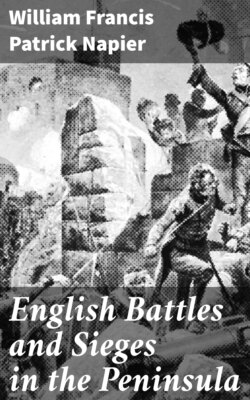Читать книгу English Battles and Sieges in the Peninsula - William Francis Patrick Napier - Страница 16
На сайте Литреса книга снята с продажи.
Combats on the Coa and Agueda. (July, 1810.)
ОглавлениеTable of Contents
“I have fished in many troubled waters, but Spanish troubled waters I will never try again.”
Thus said Sir A. Wellesley after the campaign of Talavera, by which he had acquired the title of Viscount Wellington, and a thorough knowledge of the Spanish character. Looking then to Portugal as his base for future operations, he conceived and commenced the gigantic lines of Torres Vedras as a depository for the independence of the Peninsula—a grand project, conceived and enforced with all the might of genius. But while preparing this stronghold he did not resign the frontier, and when Massena, Prince of Essling, menaced Portugal in 1810 with sixty-five thousand fighting men in line, besides garrisons and reserves, he found a mingled British and Portuguese army ready to oppose him.
This defensive force was disposed in two distinct masses. One under General Hill opposed invasion by the line of the Tagus, the other under Lord Wellington opposed it by the line of the Mondego; they were however separated by the great Estrella mountain and its offshoots, and Massena, when he took Ciudad Rodrigo, could concentrate his whole army on either line, moving in front of the Estrella by a shorter and easier road than the English general could concentrate his troops behind that mountain. Lord Wellington opened indeed a military road which shortened the line of co-operation with Hill; yet this was only an alleviation, the advantage remained with the French, and Wellington had to trust his own quickness and the strength of intermediate positions for uniting his army in the lines of Torres Vedras. Yield ground without force however he would not, and therefore had, previous to the fall of Ciudad Rodrigo, detached General Robert Craufurd with the light division, two regiments of cavalry, and six pieces of horse-artillery, to the Agueda, in observation of the French army. On that advanced position they sustained several actions. The first at Barba de Puerco, a village, between which and the opposite French post of San Felices yawned a gloomy chasm, and at the bottom, foaming over huge rocks, the Agueda swept along beneath a high narrow bridge. This post, held by the English riflemen, was of singular strength, yet scarcely was the line of the Agueda taken when General Ferey, a bold officer, desirous to create a fear of French enterprise, attempted a surprise.
Secretly placing six hundred grenadiers below, at an hour when the moon, rising behind him, cast long shadows from the rocks deepening the darkness of the chasm, he silently passed the bridge, surprised and bayoneted the sentinels, ascended the opposite crags with incredible speed, and fell upon the picquets so fiercely that all went fighting into the village while the first shout was still echoing in the gulf behind. So sudden was the attack, so great the confusion, that no order could be maintained, and each soldier encountering the nearest enemy fought hand to hand, while their colonel, Sidney Beckwith, conspicuous from his lofty stature and daring action, a man capable of rallying a whole army in flight, exhorting, shouting, and personally fighting, urged all forward until the French were pushed down the ravine again in retreat.
After this combat Craufurd kept his dangerous position for four months, during which several skirmishes took place. The one of most note was at the village of Barquilla, where he surprised and captured some French horsemen, but afterwards rashly charging two hundred French infantry under Captain Gouache, was beaten off with the loss of the cavalry colonel, Talbot, and thirty-two troopers.
